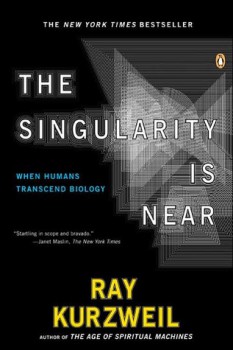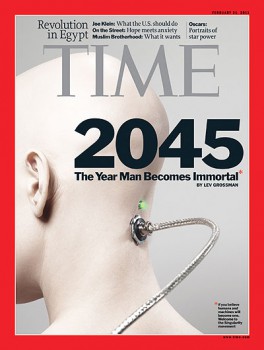33 Years to Immortality. Maybe.
 In 2045 we will reach Event Horizon, aka the Singularity. In that year we will transcend biology and our bodies will meld with machines. “There will be no distinction, post-Singularity, between human and machine or between physical and virtual reality,” predicts author Ray Kurzweil in his 2005 treatise The Singularity is Near.
In 2045 we will reach Event Horizon, aka the Singularity. In that year we will transcend biology and our bodies will meld with machines. “There will be no distinction, post-Singularity, between human and machine or between physical and virtual reality,” predicts author Ray Kurzweil in his 2005 treatise The Singularity is Near.
Though it built computer intelligence, humanity will be surpassed by its creation. Powered by artificial intelligence, machines will design their next generation without human intervention, growing exponentially beyond all human potential. These machines will not only be smart, but indistinguishable from humans. Writes Kurzweil: “Within several decades information-based technologies will encompass all human knowledge and proficiency, ultimately including the pattern-recognition powers, problem-solving skills, and emotional and moral intelligence of the human brain itself.”
Kurzweil’s predictions of the Singularity are optimistic: Rather than being reduced to ineffectual dinosaurs headed for slow extinction, or wiped out in some Terminator-like rise of the machines, we will merge with technology, and our bodies will no longer be subject to disease and weakness and age. “We can expect that the full realization of the biotechnology and nanotechnology revolutions will enable us to eliminate virtually all medical causes of death,” writes Kurzweil.
So 33 years until immortality. But what sort of a life will we lead in this Brave New World of man-machine perfection?
It’s easy to write off predictions about the Singularity. Computers are only what we, their creators, program them to be. Machines can replace assembly line work or perform hazardous duties that no human being should be forced to perform, but they are merely tools, and will never replace human ingenuity, morality, or artistry. Right?
But this safe picture starts to erode when you begin to think about how far technology has come in our lifetime. From my own perspective I remember getting introduced to TRS-80s (“Trash-80s”) back in grade school; big cubical chunks of metal with a small green screen and a built in keyboard that would perform turtle graphics or rudimentary word processing. “Computer class” was a brief diversion, an amusing aside before you got back to the business of real education with papers and books. And maybe a calculator.
Now my kids are walking around with iPod touches and my wife has an iPhone. I’m writing on the Black Gate website here on the internet. We’re shedding computers and electronic gadgets with impunity; before we get home with our new Kindle it’s been replaced by a Fire. We’re instant messaging, sending digital photos that have eradicated traditional photography. The days of Tandy 1000s and Apple IIs are long gone, replaced by the likes of this machine.
 Yeah, the Singularity seems so ridiculously far-fetched… then I think about what medical science has accomplished. We are replacing hips and knees, limbs, and even hearts, with artificial organs of plastic and metal. Your child suffers from Type 1 diabetes, we’re creating an artificial pancreas. We can replace faces torn off by industrial accident, implant neural stimulators in brains. A radical upgrading of our bodies’ physical and mental systems is already under way.
Yeah, the Singularity seems so ridiculously far-fetched… then I think about what medical science has accomplished. We are replacing hips and knees, limbs, and even hearts, with artificial organs of plastic and metal. Your child suffers from Type 1 diabetes, we’re creating an artificial pancreas. We can replace faces torn off by industrial accident, implant neural stimulators in brains. A radical upgrading of our bodies’ physical and mental systems is already under way.
So I think about technology, and the amazing rate at which new products are introduced, adopted, and give way to even more powerful machines. I think about medical science, how far we’ve come and where we’re headed. And I start to think that Kurzweil just might be right. The Singularity might be our inescapable destiny. Maybe.
The Singularity is Near is rife with fearless and (depending on your point of view) chilling predictions: For example, by 2029 a computer will pass the “Turing” test, indicating intelligence indistinguishable from that of biological humans. Think Blade Runner but without even a Voight-Kampff empathy test to draw the line between human and replicant (Deckard was a replicant himself, don’t you know). In the 2030s Nanotechnology will enable the design of nanobots, robots at the molecular level that can enter the human body to eradicate diseases and reverse aging.
Wait a minute: 2029? The 2030s? These are right around the corner. Even 33 years is a proverbial drop in the bucket in the grand cosmos of time. It all seems so incredible: Even considering the rapid rate of technological change, how can we possibly make the leap from the relatively primitive AI of today (“smart” cars and bombs, unmanned NASA craft) to a machine with intelligence indistinguishable from that of a human? Kurzweil has an explanation: His theory of the Singularity is based on the concept of the exponential growth of technology. Technological progress is not a straight, predictable line, but is doubling every year. We are currently in “the knee of the curve”; soon this rate of growth will explode off the charts. Picture a horizontal line on a graph that looks rather flat for a long time (Neanderthal man through the 1700s), then begins to arc upwards during the Industrial Revolution before soaring straight up to the near vertical.
Kurzweil states that there are six epochs of evolution, all tied to intelligence and information. These include Epoch 1, Physics and chemistry, in which information is contained in atomic structures; Epoch 2, Biology, the evolution of DNA; Epoch 3, Brains, in which information spreads to neural patterns; Epoch 4, Technology, in which information spreads to hardware and software designs; Epoch 5, the Merger of Technology and Human Intelligence, during which biology and human intelligence are integrated into an exponentially expanding human technology base (this is when the Singularity occurs). In Epoch 6, The Universe Wakes Up. During this last phase patterns of matter and energy in the universe become saturated with intelligent processes and knowledge. This intelligence will spread outward at the speed of light or faster and make the entire universe its own.
We’re currently approaching the end of Epoch 4 and nearing Epoch 5, Kurzweil says. Hold on to your seats.

There are some very real philosophical and ethical problems with the Singularity that Kurzweil, for all his singular brilliance (and he is brilliant, there’s no doubt about that) fails to adequately address in this book, at least to my satisfaction. For example, if the Singularity is absolutely inevitable, of what significance could the next three decades or so possibly hold? Our only options seem to be a) arrest of computer design in a violent Luddite revolt to reclaim humanity, or b) ensuring we make it to 2045 at all costs. Kurzweil has made it no secret that he is striving for the latter, augmenting his 64 year old body with a half-dozen intravenous therapies each week and taking more than 250 pills daily to halt the aging process. He claims to have the biological age of a 40-year-old man.
I’m not sold on artificial intelligence yet, either. I know that computers can beat elite chess masters at their own game, but so what; these are just programs that understand all the moves on a finite board with finite pieces. What about real AI, self-aware computers that can innovate or react with emotional or moral responses? Color me a bit skeptical. There are some signs that some of Kurzweil’s predictions about the rate of technology expansion are falling short; he says that computers arriving at the beginning of 2010 will become essentially invisible; woven into our closing, embedded in our furniture in our environment. I’m not seeing that yet (but maybe it’s there, and I can’t see it. Or maybe he’s referring to wireless internet). I am seeing evidence of “high-resolution, full-immersion visual auditory virtual reality at any time,” but not to the degree that Kurzweil predicts. But even if he’s off by a decade or two, it seems that a lot of these changes are happening. So maybe the Singularity is coming, but not in 2045.
Another question that looms in my frail, finite human mind is, assuming Kurzweil is correct, what will we do in this post-Singularity future? Live in a permanent virtual reality? Work, for better or worse, will be eliminated. Teachers will no longer be needed; we will “upload” educations. Doctors will no longer be needed; DNA reprogramming, android bodies, and nanobots in the bloodstream will render medical decision making obsolete, medicinal art replaced by mechanistic certainty. There will be no professions. One of the most amazing advances Kurzweil postulates is the development of nanotechnology that will allow construction at the molecular level, meaning we’ll literally be able to build anything our super-enhanced minds can conceive.
Kurzweil also skirts around the issue of whether humanity as we understand the concept will remain; he defines humanity as “the species that inherently seeks to extend its physical and mental reach beyond current limitations.” We will certainly do that post-Singularity, but if we have no bodies, and brains that multiply our intelligence a billionfold, are we still human at that point? Kurzweil’s definition of humanity is an interesting one. Humanity is not a physical thing, a bipedal mammal with a large brain and opposable thumbs, it’s a state of reaching for the beyond:
To me, the essence of being human is not our limitations—although we do have many—it’s our ability to reach beyond our limitations. We didn’t stay on the ground. We didn’t even stay on the planet. And we are already not settling for the limitations of our biology.
The biggest question I have after reading The Singularity is Near is, what would a life without death resemble? I think of being with my family forever, not ever worried about being separated by death via cancer or strokes or kidney failure. With advanced brain scanning techniques we could upload ourselves onto a computer and live forever. Reality would only be limited by our imagination; we could live in any era, even enter the minds of another or become someone else. Untrammeled joy. Then part of me thinks about Tolkien’s Numenoreans, always pushing for more life, striving with Gods for immortality, achieving it at any price, even their own destruction, which they eventually wrought by their own hands. I read Kurzweil’s predictions and I also wonder if such a life would be worth living.
Without death, will there be any urgency to life? Or will the Singularity finally sever the chains of biological existence and allow us to become Gods, at peace with a universe of intelligence?
… 33 years to immortality. But what kind of lives will we lead?
I know a biotech researcher whose team is developing fully replaceable organs–your OWN hot-swappable organs, that is–and he swears they’ll be ready for Prime Time in 5-6 years, tops.
They’ve already got skin done, and kidneys will be ready in the next few months. The current hold-up with, say, livers is getting the blood vessels to develop properly.
Exciting, and absolutely nuts for what it means for us as a species.
I think the entire point of the Singularity is that questions like “what will we do?” will at that point be moot – post-humans will be *so far* beyond us that issues such as work and purpose will become mutually unintelligible between the remaining humans and the new post-humans.
In other words, it’s a question which will be answered for us, by intelligences vastly superior to our own. Far more pressing for me personally is the interim period (a very large chunk of our lives) in which we approach the Singularity – our current socioeconomic system more or less guarantees most of the Earth’s population will get solidly left behind by the coming advances, and the line between haves and have-nots will become bewilderingly large. Far more than what happens *after* the Singularity, the question of how many of us, and which of us, will be allowed to benefit from its advances *before* the Singularity, looms large in my mind.
I agree with Sarah in her worries. Is the supposed Post Singularity existence only going to be for the wealthy? What about the have nots who cannot afford the various treatments?
But from what I can tell, Kurzweil is wildly over optimistic in his projections. Our most advanced computers only have the intelligence of a lizard. And our computing prowess is going to be hitting a wall soon when materials cannot be shrunk any further. Its called something, but I don’t remember it. Anyway, unless we find new materials or quantum computing actually develops, the Singularity will be coming much later, if ever, than Kurzweil predicts.
I’ve said this before and I’ll say it again here: Belief in the Singularity is the belief in God and the Rapture for people who think they’re too sophisticated to believe in God and the Rapture.
“I know that computers can beat elite chess masters at their own game, but so what; these are just programs that understand all the moves on a finite board with finite pieces.”
Chess is easy. You know what game computers totally suck at? Bridge.
“Chess is easy. You know what game computers totally suck at? Bridge.”
this made me laugh pretty hard.
Computers also suck at Arimaa, in fact there’s a $10,000 prize if someone can create a program that can beat the world’s best Arimaa player.
also if this singularity thing ever starts happening i’d rather be put in the ground
And I think computers stink at playing Go against master level players, too.
Far more pressing for me personally is the interim period (a very large chunk of our lives) in which we approach the Singularity – our current socioeconomic system more or less guarantees most of the Earth’s population will get solidly left behind by the coming advances, and the line between haves and have-nots will become bewilderingly large.
Kurzweil is confident that molecular assembly will defeat poverty by providing extremely low-cost manufactured foods. And then he would argue that a superintelligent AI equipped with nanotechnology would make all our problems of inequality seem rather small. Again, that’s whether you buy all this to begin with.
I’ve said this before and I’ll say it again here: Belief in the Singularity is the belief in God and the Rapture for people who think they’re too sophisticated to believe in God and the Rapture.
Kurzweil states that the Singularity will be the equivalent of “finding” God. A quote from the book: “Once we saturate the matter and energy in the universe with intelligence, it will “wake up”, be conscious, and sublimely intelligent. That’s about as close to God as I can imagine.” He takes the opposite view of the traditional theory of God: Rather than a conscious creator who got everything started, then stepped back, Kurzweil says a conscious universe will “step in” during Epoch 6.
Chess is easy. You know what game computers totally suck at? Bridge.
🙂 I flipped Missle Command back in the day, so I am confident I can beat the robotic overlords of the Singularity anyway.
A lot of our social connections will become obsolete. Will there still be love? Friendship? Marriage? Geez, many people can’t even stay married for 50 years much less 5000 and the question becomes who is that interesting for that long a period? I think mankind is more than what Kurzweil says: ideally we are a balance between heart and brain. And, if hearts are included in the Singularity, what will determine its sense of others and needs, etc. The biggest question I have is what happens to the Essence that is each of us? Religions and nations have been trying since time immemorial to make us all think, act and be alike. Looks like the Singularity would succeed?
When anyone complains about birthdays, the response is that they beat the alternative. In this case, that alternative beats this Singularity one IMO.
Interesting article, as usual, Brian. Thanks for posting it.
BB
Jackson,
Spot on. The mythical Singularity also conveniently grants these people immortality without judgement or submission to a higher power. A great deal of wishful thinking surrounds the Singularity.
Sarah,
I thought Altered Carbon (the sequels much less so) presented an interesting look at what the haves and have-nots would look like in your scenario.
The transition between human-better vs. computer-better:
xkcd.com/1002/
I have to agree about the game which computers are least likely to outdo humans at.